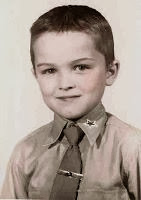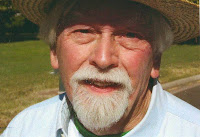Their home was sited in a burrow beside the South Platte River between 15th and 20th Streets. It was away from the river’s edge and across the sidewalk where so many of the Big People ran, walked, and bicycled. The trees. shrubbery, weeds, and grasses ensured that their door was invisible except to the most diligent searcher. Once in a great while a dog off his leash sniffed it out. Most often on those occasions , the impatient owner would call the dog away while Oberon and Puck would sit quietly and not knowing what the dog would do. If he were a digger, enthusiastic with his freedom from the leash and the confines of the small condo of his master, the animal might do some damage to the passage way. But they weren’t scared for their personal safety having planned their castle with two escape hatches opening at least ten feet away from the main entrance.
The two had reveled in a golden day of Indian summer with the leaves like so many flambeaux. Early on, they had gathered driftwood, which had washed from who knew where in the high Rockies already covered with their first coating of snow. Crossing the sidewalk to avoid the Big People required careful planning, but years of training and experience had taught them how to avoid if not their enemies at least their adversaries. The sticks of future firewood were now stored away. A few more weeks of harvesting this crop of the river would have the wood room chuck full.
After lunch, the two had flown over to Sixteenth Street to see the sights and doings of the Big People. Oberon had watched two men playing a good game of chess until Puck, not being a chess aficionado, pulled him away. Oberon at least once a week played chess with Old Casimir. Nobody knew how old he was. Probably didn’t know himself, but everybody knew that he was old. During their last visit the old man had told about the little steamboat that had steamed up and down the river on hot summer nights carrying some of the Big People. Usually somebody would bring a ukulele, a banjo, or a guitar -sometimes even all three. They’d sing songs like LORENA or SHINE ON HARVEST MOON not too well, but it was nice listening to them.
Oberon and Puck had flitted down Sixteenth window-shopping. Naturally, Puck found a T-shirt he wanted.
“I’m going to get Esmeralda to make me a shirt like that.”
“How you going to pay for it?”
“Oh, I’ll just baby sit Carlos; she’ll be glad to get rid of him for a day.”
“Let me know ahead so I can escape. I’ll go fishing for minnows so we can have them for supper.”
“I don’t understand why you don’t like children so. After all, you were once one yourself.”
‘’Yes, and I remember what a troll I was”
“Oh! You were never so bad as Ivan under the Fifteenth Street bridge even before he became civilized. I could never have fallen in love with such a creature.”
“Don’t try to pull your lovey dovey trick on me. I’m not going to stay around this house all day just to hear you going getchy getchy goo and Carlos shriek every time he wets his diaper which happens far too often.”
“You’ll leave me to the mercies of Maria.”
“What’s she got to do with anything?”
“You know what a racist she is wanting to see that we fairies don’t all die off. Every time I have Carlos over, here she comes telling me that I should have a family of my own.”
“Just tell her you don’t have the right machinery. With Esmeralda and Abendigo around we don’t have to worry about fairies of any variety dying out, How many kids has she produced?”
“Lordy, I don’t know. Gave up trying to keep track after number six, the red head. Whenever she brings Carlos over, she let’s me know his name.”
“What will you do if it’s raining outside?”
“Haven’t done it in a long time. Go down to the Bale of Hay Saloon and hide up under the eaves. When a drunk comes out, I’ll make myself visible to him.”
“You know we aren’t supposed to appear to the Big People!”
“Doesn’t matter. What would you do if you saw a twelve inch fairy while drunk? True, it might scare you away from the bottle, but would you tell anybody about seeing him? Your friends would just say, “He’s finally got the DTs,” and the bar tenders would eighty-six you permanently.”
“Why, Oberon, you sound like a one man temperance society!”
“There’s nothing temperate about my trying to escape Carlos.”
While Puck was cooking supper, Oberon sat in his lounge chair watching the television. Obviously, they couldn’t have a regular set down in their house. It was an Ipod that a Big Person had lost in Confluence Park. The weight was too heavy for them to fly it to their house, so they had lugged it across the South Platte, over Cherry Creek, and then down the sidewalk to their home. Vulcan, who knew most everything about the Big People’s goods, had shown them how to operate the thing. Now it was a part of their lives teaching them much about the Big People. True, the batteries died from time to time. Vulcan had taken Oberon to one of the Big Man’s storehouses and showed him how to get replacements. He had to fly out the door while it was being opened by a customer. Even though they had no money, fairies were not supposed to steal from the Big Men. Oberon paid by washing the upper windows of the storehouse.
They had already known that the Big People came in different colors. Some dressed differently. Others lived where they couldn’t see the mountains; still others built their houses by really big rivers which had big waves that splashed continually against the bank. Some waves were really big, much taller than any of the Big People.
After they had started watching the television, they had become almost adept enough to be considered bi-lingual. Every night after cleaning up the kitchen, they sat in their separate lounge chairs and focused upon the flickering figures upon the screen. The two had been following the Gay marriage debate amongst the Big People with a personal interest and an absolute confusion.
Puck had declared, “I just don’t see what the fuss is all about. When we two joined, the He-She’s didn’t have a tizzie. They just ate, drank, and danced like us, the He-He’s and the She-Shes. Certainly Abendigo and Esmeralda with their ever increasing brood were not affected much less harmed.”
Oberon joined in with, “I reckon that some Big Men always need something to bitch about. This is even better than most topics because it has nothing to do with them. If any changing has to be done, somebody else will have to do the changing.”
“Say, I’m out of glitter for my wings and you didn’t remind me while we were downtown. You might think I’m dowdy without a full coat of glitter.”
“To show you how I feel about your glitter let’s go to bed for a session of He-Heing.”
They didn’t even put on their night shirts.
About the Author
Although I have done other things, my
fame now rests upon the durability of my partnership with Carl Shepherd; we
have been together for forty-two years and nine months as of today, August
18the, 2012.
Although I was born in Macon, Georgia
in 1928, I was raised in Birmingham during the Great Depression. No doubt I still carry invisible scars caused
by that era. No matter we survived. I am talking about my sister, brother, and I. There are two things that set me apart from
people. From about the third grade I was
a voracious reader of books on almost any subject. Had I concentrated, I would have been an authority
by now; but I didn’t with no regrets.
After the University of Alabama and
the Air Force, I came to Denver. Here I
met Carl, who picked me up in Mary’s Bar.
Through our early life we traveled extensively in the mountain
West. Carl is from Helena, Montana, and
is a Blackfoot Indian. Our being from
nearly opposite ends of the country made “going to see the folks” a broadening
experience. We went so many times that
we finally had “must see” places on each route like the Quilt Museum in
Paducah, Kentucky and the polo games in Sheridan, Wyoming. Now those happy travels are only memories.
I was amongst the first members of the memoir writing class. While it doesn’t
offer criticism, it does offer feedback.
Also just trying to improve your writing helps no end.
Carl is now in a nursing home, I don’t
drive any more. We totter on.





